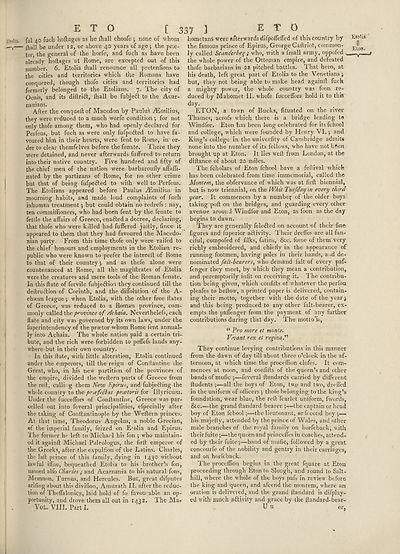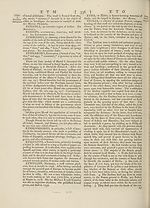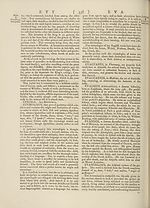Encyclopaedia Britannica, or, a Dictionary of arts, sciences, and miscellaneous literature : enlarged and improved. Illustrated with nearly six hundred engravings > Volume 8, ELE-FOR
(365) Page 337
Download files
Complete book:
Individual page:
Thumbnail gallery: Grid view | List view

Etolia.
*
E T O [3
ful 40 fuch lioflages as he fliall choofe j none of whom
/hall be under 12, or above 40 years of age j the prae¬
tor, the general of the horfe, and fuch as have been
already hoftages at Rome, are excepted out of this
number. 6. Etolia /hall renounce all pretenfions to
the cities and territories which the Romans have
conquered, though thofe cities and territories had
formerly belonged to the Etolians. 7. The city of
Oenis, and its diftridl, /hall be fubjeft to the Acar-
nanians.
After the conqueft of Macedon by Paulu's iEmilius,
they were reduced to a much worfe condition *, for not
only thofe among them, who had openly declared for
Perfeus, but fuch as were only fufpe&ed to have fa¬
voured him in their hearts, were fent to Rome, in or¬
der to clear themfelves before thefenate. There they
were detained, and never afterwards fu/Fered to return
into their native country. Five hundred and fifty of
the chief men of the nation were barbaroufly affaffi-
nated by the partizans of Rome, for no other crime
but that of being fufpedted to wilh well to Perfeus.
The Etolians appeared before Paulus ALmilius in
mourning habits, and made loud complaints of fuch
inhuman treatment •, but could obtain no redrefs : nay,
ten commiffioners, who had been fent by the fenate to
fettle the affairs of Greece, enabled a decree, declaring,
that thofe who were killed had fuffered ju/tly, fince it
appeared to them that they had favoured the Macedo¬
nian party. From this time thofe only were raifed to
the chief honours and employments in the Etolian re¬
public who were known to prefer the interelf of Rome
to that of their country} and as thefe alone were
countenanced at Rome, all the magiftrates of Etolia
were the creatures and mere tools of the Roman fenate.
In thisftate of fervile fubjeftioa they continued till the
deltruction of Corinth, and the diffolution of the A-
chtean league*, when Etolia, with the other free Hates
of Greece, was reduced to a Roman province, com¬
monly called the province o f Achaia. Neverthelefs, each
Hate and city was governed by its own laws, under the
fuperintendency of the praetor whom Rome fent annual¬
ly into Achaia. The whole nation paid a certain tri¬
bute, and the rich were forbidden to poflefs lands any¬
where but in their own country.
In this Hate, with little alteration, Etolia continued
under the emperors, till the reign of Conflantine the
Great, who, in his new partition of the provinces of
the empire, divided the weftern parts of Greece from
the rell, calli g them Nevo Epirus, and fubjedHng the
whole country to the prcefecius prcetoru for Illyricum.
Under the fucceflors of Conftantine, Greece was par¬
celled out into feveral principalities, efpecially after
the taking of Conllantinople by the Weftern princes.
At that time, Theodorus Angelus, a noble Grecian,
of the imperial family, feized on E'olia and Epirus.
The former ho left to Michael his fon *, who maintain¬
ed it againft Michael Paleologus, the firft emperor of
the Greeks, after the expulfion of the Latins. Charles,
the laft prince of this family, dying in 1430 without
lawful iifue, bequeathed Etolia to his brother’s fon,
named alfo Charles ; and Acarnania to his natural fons,
Memnon. Turnus, and Hercules. But, great difputes
arifing about this divifion, Amurath II. after the reduc¬
tion of Theffalonica, laid hold of fo favourable an op¬
portunity, and drove them all out in 1432. The Bla-
Vol. VIII. Part I.
37 3 E T o
hometans were afterwards difpolTefted of this country by
the famous prince of Epirus, George Caftriot, common¬
ly called Scanderheg i who, with a fmall army, oppofed
the whole power of the Ottoman empire, and defeated
thofe barbarians in 22 pitched battles. That hero, at
his death, left great part of Etolia to the Venetians ;
but, they not being able to make head againft fuch
a mighty power, the whole country was loon re¬
duced by Mahomet II. whofe fucceffors hold it to this
day.
ETON, a town of Bucks, fituated on the river
Thames, acrofs which there is a bridge leading ta
Windfor. Eton has been long celebrated for its fchool
and college, which were founded by Henry VI. j and
King’s college in the univerfity of Cambridge admits
none into the number of its fellows, who have not b#en
brought Up at Eton. It lies weft from London, at the
diftance of about 20 miles.
The fcholars of Eton fchool have a fefiival which
has been celebrated from time immemorial, called the
Montetn, the obfervance of which w as at firft biennial,
but is now triennial, on the Whit Tuejday in every third
year. It commences by a number of the older boys
taking poll on the bridges, and guarding every other
avenue around Windfor and Eton, as foon as the day
begins to dawn.
They are generally fele£ted on account of their fine
figures and fuperior a£livity. Their drefies are all fan¬
ciful, compofed of filks, fatins, &c. fome of them very
richly embroidered, and chiefiy in the appearance of
running footmen, having poles in their hands, a .d de¬
nominated falt-bearers, who demand fait of every paf-
fenger they meet, by which they mean a contribution,
and peremptorily iniit on receiving it. The contribu¬
tion being given, which confilts of w hatever the perlon
pleafes to beftow', a printed paper is delivered, contain¬
ing their motto, together with the date of the year j
and this being produced to any other falt-bearer, ex¬
empts the paffenger from the payment of any farther
contributions during that day. The motto'k,
“ P/ •0 more et monte.
Vivant rex et regina.”
They continue levying contributions in this manner
from the dawn of day till about three o’clock in the af¬
ternoon, at which time the proceflion clofes. It com¬
mences at noon, and confifts of the queen’s and other
bands of mufic j—feveral ftandards carried by different
ftudents ;—all the boys of Eton, twp and two, drefled
in the uniform of officers j thole belonging to the king’s
foundation, wear blue, the reft fearlet uniform, fwords,
&c.—the grand ftandard bearer ;—the captain or head
boy of Eton fchool;—the lieutenant, er fecond boy
his majefty, attended by the prince of Wales, and other
male branches of the royal family on horfeback, with
their fuite;—the queen and princeffes in coaches, attend¬
ed by their fuite *,—band of mufic, followed by a great
concourfe of the nobility and gentry in their carriages,
and on horfeback.
The proceffion begins in the great fquare at Eton
proceeding through Eton to Slough, and round to Salt-
hill, where the w hole of the boys pafs in review before
the king and queen, and afcend the montem, where an
oration is delivered, and the grand ftandard is difplay-
ed with much aftivity and grace by the ftandard-bear-
U u er,
*
E T O [3
ful 40 fuch lioflages as he fliall choofe j none of whom
/hall be under 12, or above 40 years of age j the prae¬
tor, the general of the horfe, and fuch as have been
already hoftages at Rome, are excepted out of this
number. 6. Etolia /hall renounce all pretenfions to
the cities and territories which the Romans have
conquered, though thofe cities and territories had
formerly belonged to the Etolians. 7. The city of
Oenis, and its diftridl, /hall be fubjeft to the Acar-
nanians.
After the conqueft of Macedon by Paulu's iEmilius,
they were reduced to a much worfe condition *, for not
only thofe among them, who had openly declared for
Perfeus, but fuch as were only fufpe&ed to have fa¬
voured him in their hearts, were fent to Rome, in or¬
der to clear themfelves before thefenate. There they
were detained, and never afterwards fu/Fered to return
into their native country. Five hundred and fifty of
the chief men of the nation were barbaroufly affaffi-
nated by the partizans of Rome, for no other crime
but that of being fufpedted to wilh well to Perfeus.
The Etolians appeared before Paulus ALmilius in
mourning habits, and made loud complaints of fuch
inhuman treatment •, but could obtain no redrefs : nay,
ten commiffioners, who had been fent by the fenate to
fettle the affairs of Greece, enabled a decree, declaring,
that thofe who were killed had fuffered ju/tly, fince it
appeared to them that they had favoured the Macedo¬
nian party. From this time thofe only were raifed to
the chief honours and employments in the Etolian re¬
public who were known to prefer the interelf of Rome
to that of their country} and as thefe alone were
countenanced at Rome, all the magiftrates of Etolia
were the creatures and mere tools of the Roman fenate.
In thisftate of fervile fubjeftioa they continued till the
deltruction of Corinth, and the diffolution of the A-
chtean league*, when Etolia, with the other free Hates
of Greece, was reduced to a Roman province, com¬
monly called the province o f Achaia. Neverthelefs, each
Hate and city was governed by its own laws, under the
fuperintendency of the praetor whom Rome fent annual¬
ly into Achaia. The whole nation paid a certain tri¬
bute, and the rich were forbidden to poflefs lands any¬
where but in their own country.
In this Hate, with little alteration, Etolia continued
under the emperors, till the reign of Conflantine the
Great, who, in his new partition of the provinces of
the empire, divided the weftern parts of Greece from
the rell, calli g them Nevo Epirus, and fubjedHng the
whole country to the prcefecius prcetoru for Illyricum.
Under the fucceflors of Conftantine, Greece was par¬
celled out into feveral principalities, efpecially after
the taking of Conllantinople by the Weftern princes.
At that time, Theodorus Angelus, a noble Grecian,
of the imperial family, feized on E'olia and Epirus.
The former ho left to Michael his fon *, who maintain¬
ed it againft Michael Paleologus, the firft emperor of
the Greeks, after the expulfion of the Latins. Charles,
the laft prince of this family, dying in 1430 without
lawful iifue, bequeathed Etolia to his brother’s fon,
named alfo Charles ; and Acarnania to his natural fons,
Memnon. Turnus, and Hercules. But, great difputes
arifing about this divifion, Amurath II. after the reduc¬
tion of Theffalonica, laid hold of fo favourable an op¬
portunity, and drove them all out in 1432. The Bla-
Vol. VIII. Part I.
37 3 E T o
hometans were afterwards difpolTefted of this country by
the famous prince of Epirus, George Caftriot, common¬
ly called Scanderheg i who, with a fmall army, oppofed
the whole power of the Ottoman empire, and defeated
thofe barbarians in 22 pitched battles. That hero, at
his death, left great part of Etolia to the Venetians ;
but, they not being able to make head againft fuch
a mighty power, the whole country was loon re¬
duced by Mahomet II. whofe fucceffors hold it to this
day.
ETON, a town of Bucks, fituated on the river
Thames, acrofs which there is a bridge leading ta
Windfor. Eton has been long celebrated for its fchool
and college, which were founded by Henry VI. j and
King’s college in the univerfity of Cambridge admits
none into the number of its fellows, who have not b#en
brought Up at Eton. It lies weft from London, at the
diftance of about 20 miles.
The fcholars of Eton fchool have a fefiival which
has been celebrated from time immemorial, called the
Montetn, the obfervance of which w as at firft biennial,
but is now triennial, on the Whit Tuejday in every third
year. It commences by a number of the older boys
taking poll on the bridges, and guarding every other
avenue around Windfor and Eton, as foon as the day
begins to dawn.
They are generally fele£ted on account of their fine
figures and fuperior a£livity. Their drefies are all fan¬
ciful, compofed of filks, fatins, &c. fome of them very
richly embroidered, and chiefiy in the appearance of
running footmen, having poles in their hands, a .d de¬
nominated falt-bearers, who demand fait of every paf-
fenger they meet, by which they mean a contribution,
and peremptorily iniit on receiving it. The contribu¬
tion being given, which confilts of w hatever the perlon
pleafes to beftow', a printed paper is delivered, contain¬
ing their motto, together with the date of the year j
and this being produced to any other falt-bearer, ex¬
empts the paffenger from the payment of any farther
contributions during that day. The motto'k,
“ P/ •0 more et monte.
Vivant rex et regina.”
They continue levying contributions in this manner
from the dawn of day till about three o’clock in the af¬
ternoon, at which time the proceflion clofes. It com¬
mences at noon, and confifts of the queen’s and other
bands of mufic j—feveral ftandards carried by different
ftudents ;—all the boys of Eton, twp and two, drefled
in the uniform of officers j thole belonging to the king’s
foundation, wear blue, the reft fearlet uniform, fwords,
&c.—the grand ftandard bearer ;—the captain or head
boy of Eton fchool;—the lieutenant, er fecond boy
his majefty, attended by the prince of Wales, and other
male branches of the royal family on horfeback, with
their fuite;—the queen and princeffes in coaches, attend¬
ed by their fuite *,—band of mufic, followed by a great
concourfe of the nobility and gentry in their carriages,
and on horfeback.
The proceffion begins in the great fquare at Eton
proceeding through Eton to Slough, and round to Salt-
hill, where the w hole of the boys pafs in review before
the king and queen, and afcend the montem, where an
oration is delivered, and the grand ftandard is difplay-
ed with much aftivity and grace by the ftandard-bear-
U u er,
Set display mode to:
![]() Universal Viewer |
Universal Viewer | ![]() Mirador |
Large image | Transcription
Mirador |
Large image | Transcription
Images and transcriptions on this page, including medium image downloads, may be used under the Creative Commons Attribution 4.0 International Licence unless otherwise stated. ![]()
| Permanent URL | https://digital.nls.uk/192268164 |
|---|
| Attribution and copyright: |
|
|---|
| Description | Ten editions of 'Encyclopaedia Britannica', issued from 1768-1903, in 231 volumes. Originally issued in 100 weekly parts (3 volumes) between 1768 and 1771 by publishers: Colin Macfarquhar and Andrew Bell (Edinburgh); editor: William Smellie: engraver: Andrew Bell. Expanded editions in the 19th century featured more volumes and contributions from leading experts in their fields. Managed and published in Edinburgh up to the 9th edition (25 volumes, from 1875-1889); the 10th edition (1902-1903) re-issued the 9th edition, with 11 supplementary volumes. |
|---|---|
| Additional NLS resources: |
|

